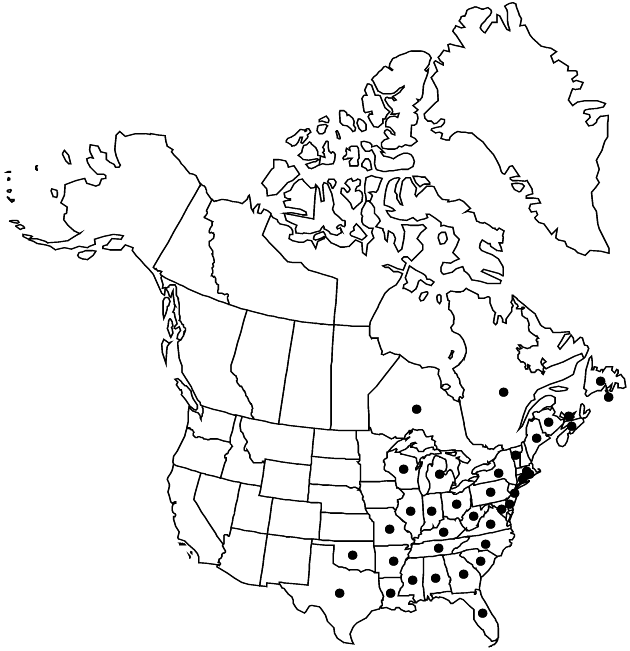Difference between revisions of "Solidago rugosa"
Gard. Dict. ed. 8, Solidago no. 25. 1768.
imported>Volume Importer |
RevisionBot (talk | contribs) m (Bot: Adding category Revision Pending) |
||
| Line 100: | Line 100: | ||
}}<!-- | }}<!-- | ||
| − | -->[[Category:Treatment]][[Category:Solidago (sect. Solidago) ser. Venosae]] | + | --> |
| + | |||
| + | [[Category:Treatment]] | ||
| + | [[Category:Solidago (sect. Solidago) ser. Venosae]] | ||
| + | [[Category:Revision Pending]] | ||
Revision as of 22:45, 13 August 2020
Plants 30–200 cm; rhizomes long-creeping, forming clones. Stems 1–50+, erect, glabrous or densely hispid to strigose. Leaves: basal withering by flowering; proximal cauline usually withering by flowering, sessile, blades elliptic to lanceolate, 68–104 × 20–25 mm, margins sharply serrate, apices acute to attenuate, abaxial faces usually hispido-strigose (at least on main nerves), nerves sometimes prominent, abaxial glabrate; mid to distal cauline sessile, blades lanceolate, elliptic or ovate, (15–)40–75(–90) × (6–)12–22(–32) mm, largest at midstem, somewhat reduced to much reduced distally, margins coarsely to finely serrate, ciliate, indument similar to proximal or denser. Heads 50–1500, secund, in secund-pyramidal paniculiform arrays 7–36(–50) × 9–26 cm, compact to lax, branches divergent and recurved, longest 0.8–34 cm, leafy-bracteate. Peduncles 1–1.8 mm, sparsely to densely hispido-strigillose; bracteoles linear- lanceolate to ovate. Involucres narrowly campanulate, (2–)2.5–3.5(–4.5) mm. Phyllaries in 3–4 series, strongly unequal, lanceolate to linear-lanceolate, acute to obtuse. Ray florets (4–)6–8(–12); laminae (0.9–)1–1.6(–2.3) × 0.4–0.7 mm. Disc florets (2–)4–6(–8); corollas 2–3.5(–4.5) mm, lobes (0.5–)0.7–1(–1.3) mm. Cypselae (narrowly obconic) 0.9–1.5 mm, moderately strigillose; pappi 1.8–2.5 mm.
Distribution

N.B., N.S., Ont., P.E.I., Que., Ala., Ark., Conn., Del., Fla., Ga., Ill., Ind., Ky., La., Maine, Mass., Md., Mich., Miss., Mo., N.C., N.J., N.Y., Ohio, Okla., Pa., R.I., S.C., Tenn., Tex., Va., Vt., W.Va., Wis.
Discussion
Subspecies 2 (2 in the flora).
Solidago rugosa is highly variable in size, array shape, and hairiness. It is similar to members of the S. canadensis complex; it differs in not having 3-nerved leaves. The species is divided into two subspecies and five varieties that can be difficult to distinguish.
Selected References
None.
Lower Taxa
Key
| 1 | Leaves relatively thin, not very rugose, usually sharply toothed, apices acuminate, glabrous or relatively soft-hairy; ray florets (4–)6–11(–13); northern (subsp. rugosa) | > 2 |
| 1 | Leaves relatively thick and firm, strongly rugose-nerved, usually blunt-toothed to subentire, apices often acute, relatively short and stiff hairy; ray florets 4–9; mostly se United States (subsp. aspera) | > 3 |
| 2 | Stems and leaves hairy; e Canada and ne United States s to Virginia | Solidago rugosa var. rugosa |
| 2 | Stems and leaves glabrous; coastal cedar bogs and swamps | Solidago rugosa var. sphagnophila |
| 3 | Arrays narrow, proximal branches not much exceeding subtending leaves; herbage sparsely hairy; mid to higher elevations in mountains | Solidago rugosa var. cronquistiana |
| 3 | Arrays wide, usually with elongate proximal branches greatly exceeding subtending leaves; herbage moderately to densely hairy; lower elevations in mountains, piedmont, and coastal plain | > 4 |
| 4 | Distal cauline leaves lanceolate to elliptic, not much reduced distally; much of range of subspecies | Solidago rugosa var. aspera |
| 4 | Distal cauline leaves ovate, much reduced distally; outer coastal plain | Solidago rugosa var. celtidifolia |